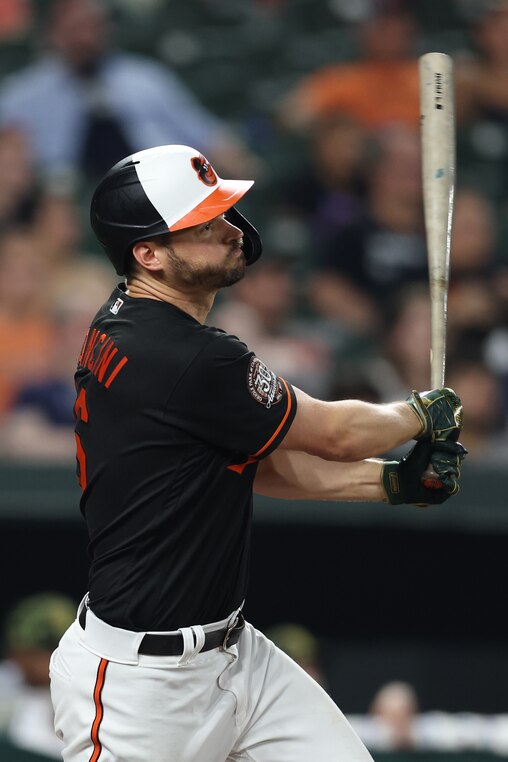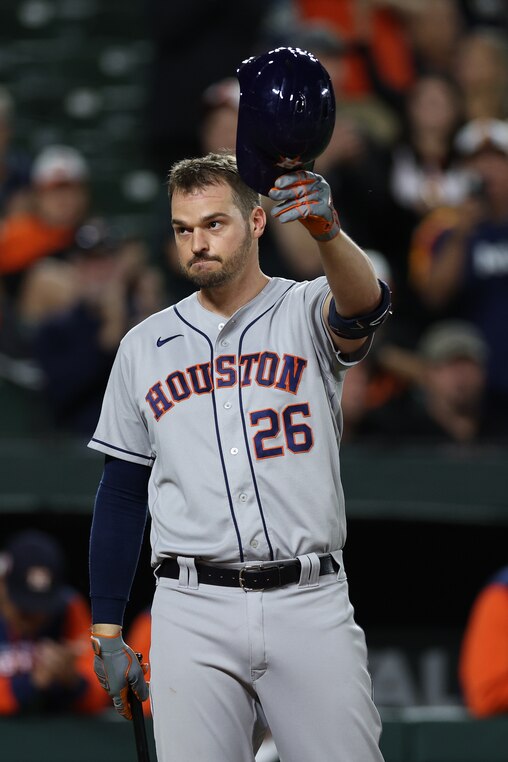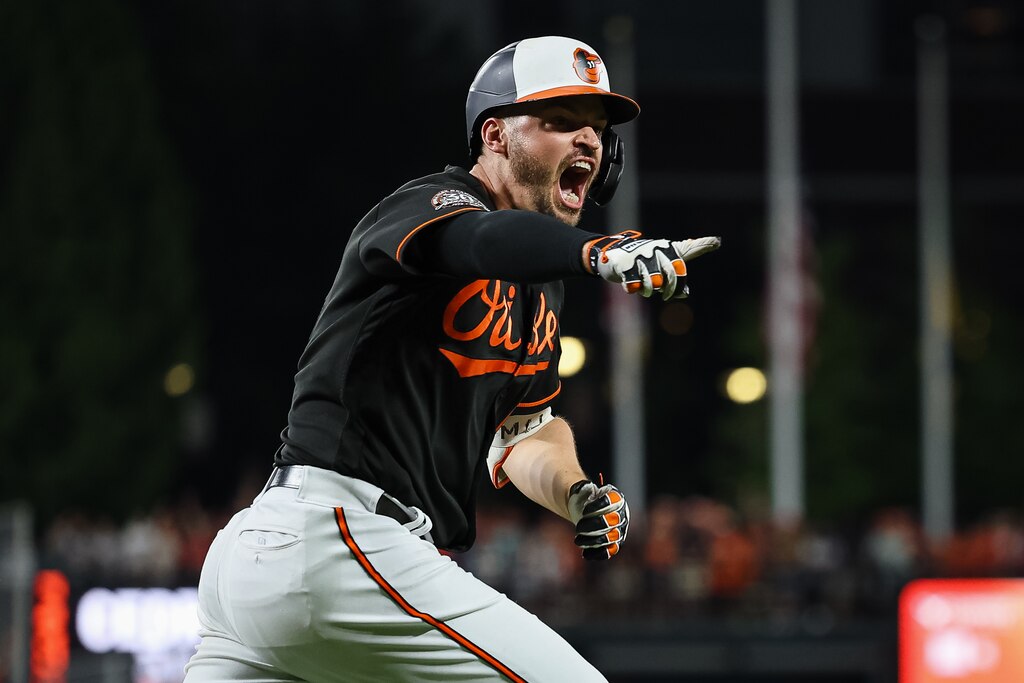It had been a month or more since Sara Perlman Mancini saw Trey Mancini in front of the mirror, doing what the baseball-obsessed tend to do. Late in the summer — the first summer without baseball in Mancini’s life for as long as he can remember — he practiced his swing.
He held no bat; there was no pitch. But, as Perlman Mancini watched her husband simulate the swing that made him a major leaguer — first, and longest, with the Orioles — she could sense the gears turning in Mancini’s mind.
For much of that summer, Mancini was at peace away from baseball. He traveled with his wife. They worked out together, they played tennis and pickleball, and he watched baseball on television as a fan.
He doesn’t regret any of that. When he looks back on his year out of the majors, he acknowledges it may have been the best thing for him — after all he’s been through, he had the time to come to terms with the trauma of a Stage 3 colon cancer diagnosis as a 27-year-old.
“Without the year off,” Perlman Mancini said, “I don’t think he would’ve been able to get to this endpoint where he is now.”
As the fifth anniversary of Mancini’s cancer diagnosis approaches in March, the first baseman feels ready — excited — to get back to baseball. He stood in front of the mirror and swung. Then he picked up his bat again after a few months away and began to face pitching. The feeling was “incredible,” Mancini said, and Perlman Mancini noticed how much fun he had being back out there again.
Read More
A comeback, Mancini realizes, is no easy feat.
But the fire that wavered after his life-altering and life-threatening cancer diagnosis has rekindled. He feels more well-rounded — there’s so much more than baseball — because the year away allowed him to work through what was “a lot to process.” Now, he hopes, a full offseason of work will lead him to one more opportunity to play the game he loves.
“Honestly, for a couple months, I thought I was going to be done. And I really enjoyed this year. I’ve enjoyed life. But at the same time I really do think I have something left to give the game,” Mancini said. “I’m going to prepare and act as though I’m going to spring training, and just hoping and trying and praying that the opportunity arises.”
So much changed when he sat down opposite Brian Ebel, Baltimore’s head athletic trainer, in March 2020. The look on Ebel’s face conveyed the seriousness of the situation. Mancini’s blood test was abnormal, showing possible internal bleeding, and Ebel — who is departing the Orioles after 40 years — urged Mancini to undergo tests that are seldom done on a 27-year-old.


The subsequent endoscopy and colonoscopy confirmed that Mancini had an aggressive cancer. Mancini credits Ebel, along with his doctors at Johns Hopkins Hospital, with saving his life. But, even without a recurrence of cancer, there are long-lasting impacts of the disease.
For the better part of the last four years, Mancini admits, he put a “Band-Aid” over the health scare. He returned to baseball in 2021 without fully processing all he endured.
Baseball was a perfect distraction. But, as Mancini fell into the usual slumps that occur for every player, he found them more difficult to break out of. There was something else in mind — the scans and testing required to make sure the cancer has not returned serving as a cloud as they neared.
For the first time, Mancini said, he had something larger than baseball to worry about: his life.
For so long, maintaining his career was his driving force, following family. And then, when his world was shaken upon the diagnosis, his post-cancer playing career carried a different mindset. He cared — that will never leave him — but “at the same time, I also had that dark cloud, the health scares, the kind of actual life-or-death situation was still hovering over me.”
“There was a bigger threat than losing my job in baseball, which was my worst fear before the cancer diagnosis,” Mancini continued. “I think it was just enough of a distraction to where it was just more difficult to get through the slumps, or correct any physical mistakes going on, or mental approach mistakes. Like, it just didn’t come as easy.”
Added Perlman Mancini: “Your biggest hurdle was, ‘Oh shit, I had a bad series.’ And then, with cancer, your life just gets transformed. What you care about changes.”
There were stretches in which Mancini performed as well as he had before his diagnosis. In 2021, upon his return for the Orioles, he hit .255 with 21 home runs in 147 games. The next year, he was traded at the deadline to the Astros, and while he hit .176 in Houston, he won a World Series there.
But that last year and a half of his professional career still sting. He signed with the Chicago Cubs for $14 million over two years, but after hitting .234 in 79 games, Mancini was released partway through his first season there.
He can look over the whole of his baseball career with fond regard, and for good reason. He participated in the Home Run Derby, earned a World Series ring and overcame the odds by even returning after cancer.
But how it ended? That has festered within him, and only now, after time away from the sport, does Mancini have a better understanding of why and how his time in Chicago went awry, or why he didn’t stick with the Miami Marlins after spring training this year.

“I think it’s easy to think that just ’cause your performance dropped, especially after what I went through, it’s OK to take it to the house and still look back and be happy with what you accomplished — which I am,” Mancini said. “But I think, at the same time, I don’t exactly love how things ended with my career, and I really do think if I’m in the right situation I can still be an impact bat. And I know saying that means nothing and I’d have to go out there and prove it, but I’m fully ready to go do that. I just kind of got that hunger back, out of nowhere, honestly.”
So in August, in front of the mirror, Perlman Mancini watched Mancini practicing his swing again without a bat in hand. His lower half, his arms, his eyes — they all tracked an imaginary ball, striking it with an imaginary piece of lumber.
He knows getting signed will be difficult; he’s turning 33 in March and spent a year away from the eyes of scouts.
But Mancini is also almost five years post-cancer. He’s alive and happy. Why not give it a try? Why not pick up a bat one more time and give it a swing, even if nothing else comes from it than a smile?
“I do think he’s truly loving life and feeling really good about where he is from a health standpoint, having a year to work on your body and the mental side,“ Perlman Mancini said. “And now, with baseball, I almost think it’s the perfect storm of, ‘OK, I love my life the way it is, but I still feel I have a lot to give.’”



Comments
Welcome to The Banner's subscriber-only commenting community. Please review our community guidelines.